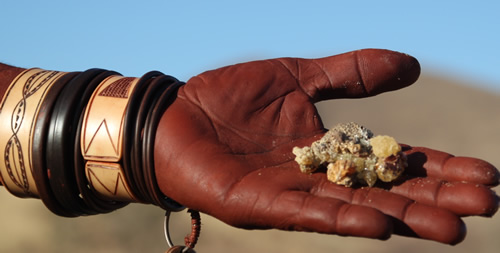
Tucked away in the northwest corner of Namibia is the Kunene Region, an extremely arid environment that is home to the nomadic Ovahimba people, and a range of endemic plant species. Products are being developed from indigenous plants such as Commiphora wildii (known locally as "omumbiri") from which a resin is sustainably harvested and traded by the Ovahimba communities for them to generate an income. The highly prized 'Myrrh' that can be extracted from the resin might soon be in a fragrance you can buy here in the UK!
The Natural Resources Institute (NRI) is supporting the establishment of a fledgling essential oil industry in Namibia, with an Innovation Fund Grant won in early 2012 from the US Government Millennium Challenge Corporation. This Grant will help NRI identify a pipeline of products, from plants like Omumbiri, to contribute to the industry's viability.
Omumbiri naturally exudes resin in response to environmental stresses and as a result, collecting the resin in no way harms the plants. Ovahimba women have used Omumbiri resin for its fragrant properties since time immemorial. They mix the resin with red ochre and animal fat to form a paste and apply it to the skin daily. The paste is usually stored in a cow horn.
 The work on Omumbiri is in collaboration with a Namibian NGO, Integrated Rural Development and Nature Conservation (IRDNC) and an estimated 1,400 Omumbiri harvesters are expected to benefit in the years to come. The first commercial harvest took place in late 2007, where 319 harvesters collected a total of 5 tonnes of Omumbiri resin.
The work on Omumbiri is in collaboration with a Namibian NGO, Integrated Rural Development and Nature Conservation (IRDNC) and an estimated 1,400 Omumbiri harvesters are expected to benefit in the years to come. The first commercial harvest took place in late 2007, where 319 harvesters collected a total of 5 tonnes of Omumbiri resin.
Veerii Tyivinda has been assisting her mother, who is part of the project, in harvesting Omumbiri for the last 5 years. According to her: "this project is important for buying food and other necessities such as blankets, and it is helpful in maintaining our culture". Harvesters earn N$50/kg (~US$6.4) for the resin, and an additional N$20/kg (~US$2.3) is generated from sales to cover management and logistical costs.
NRI's input will address efficiency and quality related matters, regulatory requirements and business development, and will forge links with the private sector and create products, thereby enabling entry into the market. Work has already started on upgrading the simple factory facilities in Opuwo in Northern Namibia to meet with the high standards of potential international fragrance buyers.
Photographs by Dave Cole

